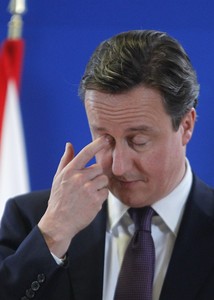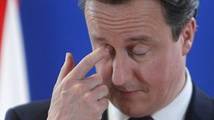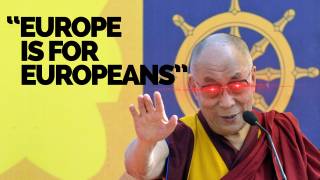Britain chooses isolation over new EU treaty
Source: metronews.ca
 After the deed was done, some leaders didn’t want to shake his hand. French President Nicolas Sarkozy walked right by him, as if he wasn’t there.
After the deed was done, some leaders didn’t want to shake his hand. French President Nicolas Sarkozy walked right by him, as if he wasn’t there.David Cameron, the British prime minister, had become Europe’s outcast.
His sin? Rejecting an invitation to join 26 European partners in a tighter financial alliance to save the euro, making Britain odd man out at a time of deep financial peril, and raising doubts about whether Britain can realistically remain a member of the European Union.
Former British Europe minister Denis MacShane, a House of Commons legislator and longtime advocate of closer ties, said the sudden break with the other 26 countries means Britain’s role in the European Union is effectively over.
"There is now little point in Britain staying in the EU," said MacShane, who was a minister in Tony Blair’s generally pro-Europe Labour Party government. "It is an historic turning point and Britain might as well get out now, as Europe’s future will be settled without us."
On the other side of the political spectrum, Robert Oulds, director of the euroskeptic think-tank the Bruges Group, agreed.
"Britain being part of the EU but holding up plans that everyone else wants is just a cause of friction," he said. "It’s creating trouble for David Cameron at home. There’s no middle way which can appease British public opinion and his own party and the interests of the European political class that wants more integration."
His prescription: a referendum on Britain’s "amicable" exit from the EU.
That would be a momentous step.
The European Union, which has grown from an alliance of six nations in 1951, has been a cornerstone of Europe’s strategy to keep the peace since World War II by bringing former adversaries together through common economic and cultural ties.
Unprecedented prosperity has flowed from its single market and its free movement of workers across borders. Integration accelerated in the past two decades with the development of a single currency, but now the euro’s survival is under threat as the continent’s debt woes spin out of control.
The EU is today so intertwined that even member countries like Britain that do not use the euro would plunge into deep and prolonged recession if the currency broke up. That’s a sobering reality that helped persuade 26 of 27 member states to consider big sacrifices of national sovereignty to keep the European dream alive.
For Britain, an island nation that prides itself on its fierce independence, the idea of ceding any more control over its destiny proved too much.
Cameron, exhausted after an all-night session and with his silk tie uncharacteristically askew, insisted Friday afternoon that Britain remains an influential EU member.
"We want to be in Europe for trade, investment, jobs and growth," he said, adding that Britain is a leading member of the NATO alliance.
But he wanted no part of the new treaty, which he said didn’t adequately protect Britain’s national interest and meant giving up too much control over regulation of Britain’s dominant financial sector.
Cameron’s desire to remain part of the EU while refusing to join the new treaty angered European leaders, who don’t want Britain to cherrypick what aspects of EU life it is willing to embrace.
Italian Prime Minister Mario Monti said that Britain would no longer be "in the heart of Europe" as it was during the Blair years.
"I think a certain isolation will come," he said, predicting that Britain will still be at the table but that its "capacity to influence" events will be greatly diminished.
[...]
Read the full article at: metronews.ca
David Cameron has done ’bad deal’ on Europe, Nick Clegg says






















